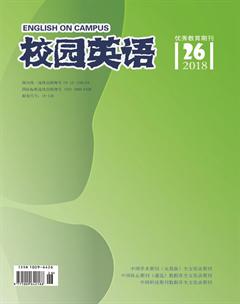A Study on English Vocabulary Teaching Strategies in Middle School under the Context of Information Technology
【Abstract】Vocabulary is the cornerstone of English learning as well as the foundation of comprehension and expression between different cultures because conversation will break down if lack of right words. However, traditional vocabulary teaching methods is time consuming and inefficient. Fortunately, the era of internet plus education is coming, which not only has the teaching techniques been innovated, but also the learning methods.
【Key words】Middle School; English vocabulary teaching; information technology; existing problems; strategies
【作者簡介】李东(1992- ),女,汉族,山东青州人,教育硕士,鲁东大学外国语学院学科教学(英语)专业,研究方向:学科教学(英语)。
1. Introduction
The effective combination of information technology and English teaching is conducive to creating a good teaching situation. Furthermore, Horizon Report put(s) forward new challenges for teachers who are supposed to be transplanted from their position as “stage on the stage” to “guide on the side”. Students are the masters of learning. Therefore, teachers should make good use of modern educational technology to stimulate students interest in learning English.
2. Problems of vocabulary teaching and learning
Firstly, teachers teaching concepts and professional qualities cant catch up with the date. Secondly, English teaching methods are too mechanized. Thirdly, vocabulary teaching evaluation cant adapt to the requirements of curriculum standard(s).
3. Strategies to vocabulary teaching in Middle School under the context of information technology
3.1 Transforming teachers teaching concepts and improving professional qualities
Teachers should firstly correct their attitude toward vocabulary teaching. There is thus no conflict between developing a firm command of grammar and learning the most essential words.Teachers are expected to master a variety of technology-based and other approaches.
3.2 Improving teaching methods
3.2.1 Using pictures on PPT to present vocabulary
Image resources are an important way for human to obtain information. For instance, in the Unit4 Earthquake of Book1, teachers can put the other words and pictures out of order about natural disasters on PPT such as storm, wind, light, thunder, and ask students to match corresponding pictures. At the same time, teachers can make good use of fading effects of pictures.
3.2.2 Applying mind mapping method in vocabulary teaching
Mind mapping can help students learn divergent thinking in vocabulary learning process and recombine English materials in their mind. For example, in the Unit 1 Friendship of Book1, teacher can guide students to design mind mapping about the qualities of friendship on PPT, students will say many words such as loyal, kind, enthusiasm, etc., which provides a solid foundation of writing and speaking.
3.2.3 Presenting vocabulary through making videos
This requires teachers to be familiar with video software to make theme-oriented videos that establishes the situation where students interest can be activated and they can experience how to use news properly.
3.2.4 Listening to English songs
Its a favorable way for students who like music. For example, there are many new vocabularies such as remember, faraway, have to, etc. Teachers played a song “Remember” with song lyrics on PPT. After listening to this song, students are amused, moved, stimulated and challenged.
3.3 Improving vocabulary teaching evaluation
Teachers can make good use of various resources such as videos, Wechat, PPT, and other information technology methods so as to give comprehensive evaluation for students. Additionally, teachers are supposed to timely and properly point out students mistakes in vocabulary learning process.
4. Conclusion
The application of information technology obviously promotes the effectiveness of students vocabulary learning. Teachers use pictures, videos, scene creation, mind mapping and students are more easily attracted to vocabulary learning that stimulates students emotion, broadens their horizons, cultivates their critical thinking and improves their vocabulary learning efficiency.
References:
[1]Allen,V.F.1983.Techniques in Teaching Vocabulary[M].Oxford:Oxford University Press.

